Three Questions Senator Durbin and the DOJ Need to Ask about Federal Solitary


On any given day, more than 15,000 federal prisoners are in "the hole."
With a population of over 215,000 prisoners, the Federal Bureau of Prisons is the nation's largest prison system. At a Congressional hearing chaired by Sen. Dick Durbin (D-Il) last summer, Bureau Director Charles Samuels said that the Bureau holds about 7 percent of its population in solitary confinement at any given time. That's a shockingly high proportion. Many states have a much smaller percentage of prisoners in solitary, even though state prisoners are far more likely than federal prisoners to be serving time for a violent offense.
Hopefully, we'll find out why. On Feb. 4, that the Bureau has agreed to a comprehensive and independent assessment of its use of solitary confinement. This is welcome news -- and long overdue.
We don't yet know much about the assessment, except that it will be conducted through the National Institute of Corrections, a division of the U.S. Department of Justice. Here are some critical areas the assessment needs to cover:
Do they all really need to be in solitary? A comprehensive look at who is in solitary and why is crucial. Solitary confinement tends to be a one-way ticket ŌĆō it's easy to get in but very hard to get out, so the numbers tend to creep ever upward. The assessment should look at each prisoner in solitary and ask if prison security really requires that he or she be there. Such reviews in states like Mississippi and Colorado have led to significant decreases in the solitary confinement population, saving millions of taxpayer dollars.
Why are the mentally ill in solitary? People with mental illness are grossly overrepresented in solitary confinement. Unable to conform their behavior to prison rules, many people with preexisting mental illness end up in solitary. Other prisoners are healthy when they enter solitary but develop mental illness as a result of the extreme social isolation and sensory deprivation they experience there.
Either way, people with mental illness suffer terribly in solitary, often leading to self-mutilation and even suicide. Solitary is so predictably harmful to this population that the American Psychiatric Association recently issued a policy statement opposing solitary confinement of persons with mental illness, and several courts have ruled that it violates the Constitution's prohibition on cruel and unusual punishment.
The Bureau claims that it excludes prisoners with mental illness from its supermax prison in Florence, Colorado, but a recent lawsuit has cast serious doubt on that claim, and besides, the Florence prison is only one of many that hold prisoners in solitary. The review should determine whether the Bureau has effective procedures to exclude the mentally ill from solitary confinement. If it doesn't, implementing such procedures must be a top priority for reform.
What are the costs and benefits? Solitary confinement is extraordinarily expensive. Illinois recently closed its only supermax prison in part because it cost more than $60,000 a year for each prisoner housed there ŌĆō three times the state's average cost per prisoner. And it's far from clear that these massive expenditures yield any benefits. Some studies show that use of solitary confinement actually makes prisons less safe. When Mississippi reduced its use of solitary confinement, prison violence plummeted. There's evidence that prisoners who spend time in solitary actually have higher recidivism rates than those who don't. The assessment should take a hard look at the costs and benefits of the Bureau's use of solitary confinement.
For too long, basic facts about the Bureau's use of solitary confinement have been hidden from public view. The assessment announced last week is an important victory for transparency and a critical first step toward reform. Based on the results of similar reviews in state prison systems, there's reason to hope that it will lead the Bureau to significantly curtail its use of this draconian, inhumane, and expensive practice.
Learn more about solitary confinement and other civil liberties issues: Sign up for breaking news alerts, , and .
